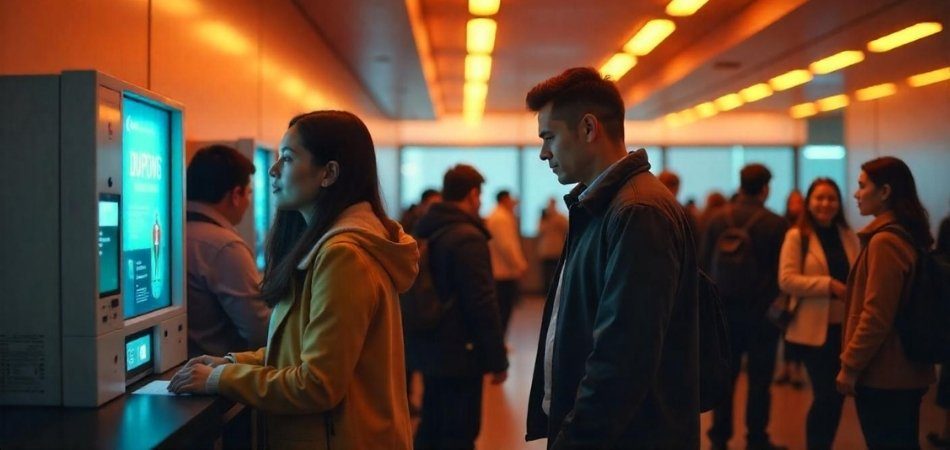A biometric is a unique characteristic used to identify a person. It can be a fingerprint, a facial feature, or even a pattern on the iris. These characteristic factors have become crucial in modern security systems, and Canada is no exception. This brings us to a key question: Who needs biometrics in Canada?
Various individuals are required to provide biometrics depending on their application type. This includes those applying for visitor visas, study permits, work permits, permanent residents, refugee status, citizenship, and permanent resident travel documents. Each of these categories requires biometric data to support background checks and verify identities.
Interested in a Canadian visa or immigration application? This article provides a detailed overview of who must submit biometric information in Canada. From visitor visas to permanent residency, we’ve got you covered.
Why Are Biometrics Important for Canadian Immigration?
The use of biometrics increases the security and reliability of Canadian immigration applications. These processes help verify an applicant’s identity by collecting fingerprints and facial photographs. By doing so, they prevent fraud and ensure that they are who they claim to be. This process protects against identity theft and unauthorized entry.

For Canadian immigration authorities, biometrics are essential for performing thorough background checks. The biometric data collected is used to match existing databases, checking for any previous criminal activity or immigration violations. This step is crucial in the Canada visa biometrics process, as it helps prevent individuals with dubious backgrounds from entering Canadian borders.
Furthermore, biometrics simplifies immigration application processing. By providing a unique and reliable way to confirm identities, biometrics reduce the chances of errors and speed up the application review process. This efficiency benefits both applicants and authorities, making the entire immigration experience more accurate and timely.
Who Needs Biometrics in Canada?
The use of biometrics has become an essential aspect of Canadian immigration, verifying identities and improving security. This system involves collecting fingerprints and facial photographs to ensure accuracy. Knowing who needs biometrics can simplify the application process and avoid delays.
Applicants for Visitor Visas
It is mandatory for individuals to provide their biometrics during the application process for a visitor visa to Canada. This requirement helps Canadian authorities verify the identity of temporary visitors, ensuring that they meet the criteria for entry and are not a security threat to the country.
Individuals Applying for Study Permits
Students seeking to study in Canada must submit biometric data when applying for a study permit. Biometrics assist in confirming their identity and help immigration officials process their applications more efficiently, ensuring a smoother entry process for international students.
Those Applying for Work Permits
As part of the background verification process, applicants for a work permit in Canada are required to submit biometrics to support their application. This requirement is part of the process in which applicants are scrutinized to ensure that they do not have any prior issues that may impact their ability to work in Canada.
Permanent Residency Applicants
The Immigration and Refugee Board of Canada will require applicants to provide biometric information before they are granted long-term residency in the country. This ensures that thorough background checks are conducted and that all requirements for security and verification of identity are met by applicants before they are granted permanent residence in the country.
Refugee Claimants
Before refugees are granted protection in Canada, they must complete biometric processing. It is crucial for the establishment of their identity, the support of their claims, and the ensuring that their background is thoroughly checked before they are granted protection that refugees undergo biometric processing.
Individuals Applying for Citizenship
There is a requirement for those applying for citizenship of the country to provide biometric information as part of their application, to verify their identity as well as to ensure they meet the necessary requirements for becoming a Canadian citizen.
Applicants for Permanent Resident Travel Documents
For permanent residents who wish to return to Canada to apply for a travel document, they are required to provide biometric evidence of their identity in order for their identity to be verified and for their status to be confirmed as permanent residents returning to Canada.
Understanding who needs biometrics in Canada can help individuals prepare their applications more effectively. Proper biometric submission ensures a smoother and faster processing experience.
Biometric Requirements for Canadian Visa Applicants
An important part of the visa application process for those seeking to enter Canada is the biometric requirement. They help to confirm identities and protect the immigration system. By gathering fingerprints and photographs, Canada ensures a higher level of security and efficiency in processing applications.
Initial Qualifications for Biometrics
For those who are seeking a visitor visa, a study permit, a work permit, or a permanent residency permit, it is a requirement that all applicants between the ages of 14 and 79 submit biometric information, including fingerprints and a digital photograph.
Locations for Submitting Biometrics
Applicants need to visit an authorized Visa Application Centre (VAC) or, in some cases, other designated service locations. These centers are equipped to securely collect biometric information, which is then used for verification against global immigration databases. The Canadian biometrics appointment process is designed to ensure all necessary steps are completed efficiently.
Documents Required at Biometric Session
When you attend your biometric session, you must bring your passport, the biometric instruction letter issued by Immigration, Refugees and Citizenship Canada (IRCC), and any other required identification documents specified in your appointment notice.
Biometric Fee
A biometric fee is required for processing. This fee is in addition to the visa application fee and must be paid online before attending the biometric session. The receipt of this payment must be presented at the time of biometric collection.
Special Exemptions
Certain individuals are free from the biometric requirements, including Canadian citizens, existing Canadian visa holders within the biometric validity period, children under the age of 14, applicants over the age of 79, and heads of state or government officials traveling on official duties.
Understanding and following the biometric requirements is crucial for a smooth and successful application process for entry into Canada. To ensure the safety of both applicants and the country, these measures are in place.
How to Prepare for Your Biometrics Appointment?
Attending a biometric appointment requires careful preparation to ensure everything goes smoothly. Proper planning can help you avoid delays and ensure that your biometrics are processed efficiently. Follow these steps to be well-prepared for your appointment.
Step 1: Confirm Your Appointment Details
Make sure you double-check all the details regarding the date, time, and location of your biometrics appointment. Be sure to find out where the nearest Visa Application Centre (VAC), or authorized location is in order to avoid any confusion on the day of your appointment.
Step 2: Gather Required Documents
Collect all the necessary documents before your appointment. Bring your passport, the biometric instruction letter from Immigration, Refugees and Citizenship Canada (IRCC), and any other required identification. Ensure all documents are current and match the information you provided in your application.
Step 3: Pay the Biometric Fee
In order to complete the biometric fee payment in advance of your appointment, you will need to print out a copy of your payment receipt and bring it with you to the VAC or service location. Make sure you pay the exact amount and confirm the details of the payment confirmation.
Step 4: Arrive Early
Plan to arrive at the biometrics location a bit early to account for any unexpected delays. Arriving ahead of time will allow you to go through any additional checks and complete the process without rushing. Aim to be on time to ensure a smooth appointment.
Step 5: Follow Health and Safety Protocols
Pay attention to any health and safety guidelines in place at the biometric collection center. This may include wearing a mask, maintaining a physical distance, and following any specific instructions given by staff. Compliance helps protect everyone’s health and ensures the process is safe. For more information on the next steps, including the timeline to get medical after Biometrics Canada, make sure to stay informed about the procedures.
What to Expect During the Biometrics Process?
Attending a biometrics appointment can be simple once you know what to expect. Here’s a quick rundown of the process so you’re well-prepared for your visit.
- Check-in Process: After arrival, check-in at the reception desk with your appointment confirmation and identification.
- Identity Verification: Staff will verify your identity by reviewing your documents, such as your passport and appointment letter.
- Fingerprint Collection: Your fingerprints will be scanned using a digital scanner, a quick and painless procedure.
- Photograph Taken: A photograph will be taken to match your biometric data with your identity.
- Data Entry: The collected biometric information will be entered into the system for processing and verification.
- Review and Confirmation: You may review the information to ensure accuracy before it’s finalized.
- Completion and Receipt: Once done, you’ll receive a receipt confirming that your biometrics were successfully collected.
Understanding these steps can make your biometrics appointment a smooth and stress-free experience.
Frequently Asked Questions
It can be difficult to understand Canada’s biometric requirements. Here are a few frequently asked questions to clarify who needs to provide biometrics, and what to expect during the process. You will learn about the essentials of Canadian biometrics through this information.
What If I Miss My Biometric Appointment?
If you miss your biometric appointment, you will need to reschedule. Missing an appointment can delay your application process, so it’s essential to contact the Visa Application Centre (VAC) or the designated service provider as soon as possible to arrange a new appointment.
How Long Are My Biometric Data Valid?
There is a general rule that biometric data is valid for ten years. However, the validity of biometric data can be influenced by many factors, such as the type of application and specific circumstances. If you wish to get a new visa or immigration status after ten years, you may have to provide updated biometric data.
Can Biometrics Be Submitted Remotely?
It is not allowed to submit biometric data through remote means, as there is a need for secure, in-person collection and verification of biometric information at an authorized Visa Application Centre (VAC) or designated location. Biometric data must be submitted in person.
Are There Additional Fees for Biometrics?
Yes, there is an additional fee for biometric processing. This fee is separate from the visa or immigration application fee and must be paid online before attending your appointment. Make sure to keep the payment receipt, as it will be required during your biometric collection.
Are There Early Bird Discounts Available?
Yes, we offer early bird discounts for registrations made well in advance. Take advantage of the current discounts and deadlines listed on the specific conference details to take advantage of the reduced rates and secure your spot as soon as possible.
Conclusion
Biometric data collection is crucial to Canadian immigration and visa processes. By using fingerprints and facial photographs, Canada increases security and identity verification. This method ensures that only individuals meeting specific criteria can enter or remain in the country, keeping the system efficient and secure.
If you’re wondering, “Who needs biometrics in Canada?” the answer is many. Biometrics are required for various applicants, including those seeking visitor visas, study permits, work permits, permanent residency, and even citizenship. Understanding this requirement can help you prepare properly and avoid delays in your application process.
As you prepare for your biometric appointment or application, remember to gather all necessary documents, pay any required fees, and follow health protocols. Best of luck with your application, and we hope your process is smooth and successful.







